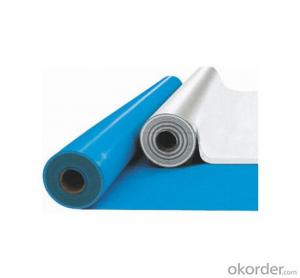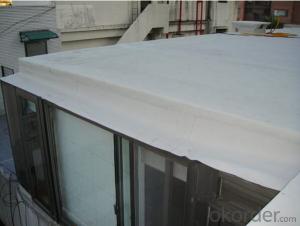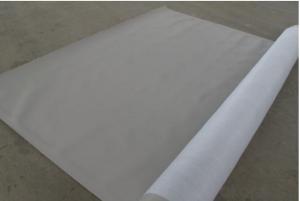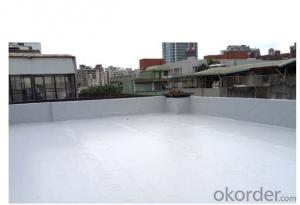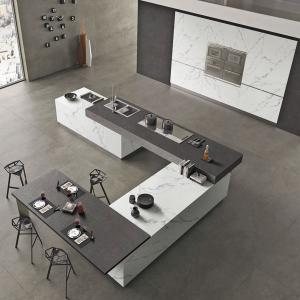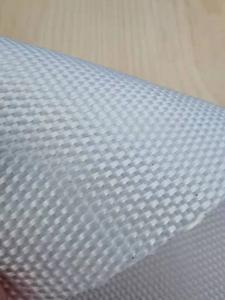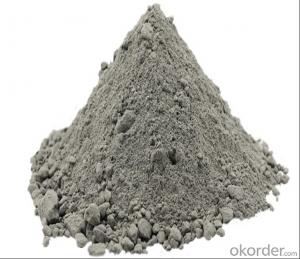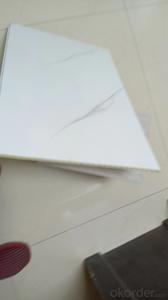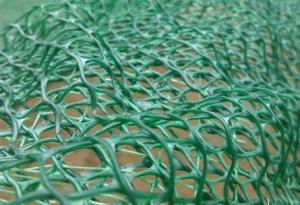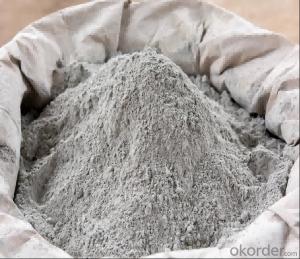PVC Roofing Waterproof Plastic Membrane Best Quality
- Loading Port:
- Qingdao
- Payment Terms:
- TT OR LC
- Min Order Qty:
- 3000 m²
- Supply Capability:
- 300000 m²/month
OKorder Service Pledge
OKorder Financial Service
You Might Also Like
Introduction of PVC Waterproof Membrane
It is an excellent high quality polymer waterproof sheet, made of PVC resin by adding plasticizer, anti-UV agent, anti-aging agent, and stabilizer and other processing aids through extrusion and molding.
As the highly recommended product by the Ministry of Consturction, it is featured by high tensile strength, great elongation, good stability, small shrinkage, low temperature performances, good resistance to weathering and root penetration and long service life.
.
Features of PVC Waterproof Membrane
1)Excellent aging resistance. Service life of roofing material is over 20 years; service life of underground material is over 50 years.
2)Root resistant penetration, specially used on planting roofings.
3)Welding installation. Joints are solid and environment friendly, no pollution.
4)High tensile strength, good elongation and dimensional stability.
5)Good plasticity, easy and suitable for details installation.
6)Fireproof. Fire extinguished out of the ignition resource.
7)Surface is smooth, no fading and dirty resistant.
8)Width is over 2m. Construction wastage is small, more economical.
Classification and Specification of PVC Waterproof Membrane
N: Homogeneous PVC membrane
L: PVC membrane with fabric backing
W: Reinforced PVC membrane
Thickness: 1.2mm/1.5mm/2.0mm
Size: 2.05mx20m
Color: white/grey, or any other colors.
Advantage of PVC Waterproof Membrane
1.) Mixing automation. Apply automatic temperature control automatic time control and automatic feed control.
2.) Extrusion equipment uses twin screw coextrusion. Screw temperature uses computer automatic temperature control system.
3.) Handpiece uses large width didhead extrusion equipment.
4.) Sophisticated three-roller calender equipment. The space between equiment is controlled by automation system.
Application of PVC Waterproof Membrane
PVC membrane applies special formula and its service life is much longer than other general waterproof membranes. Its excellent performance makes it be widely used in every field.
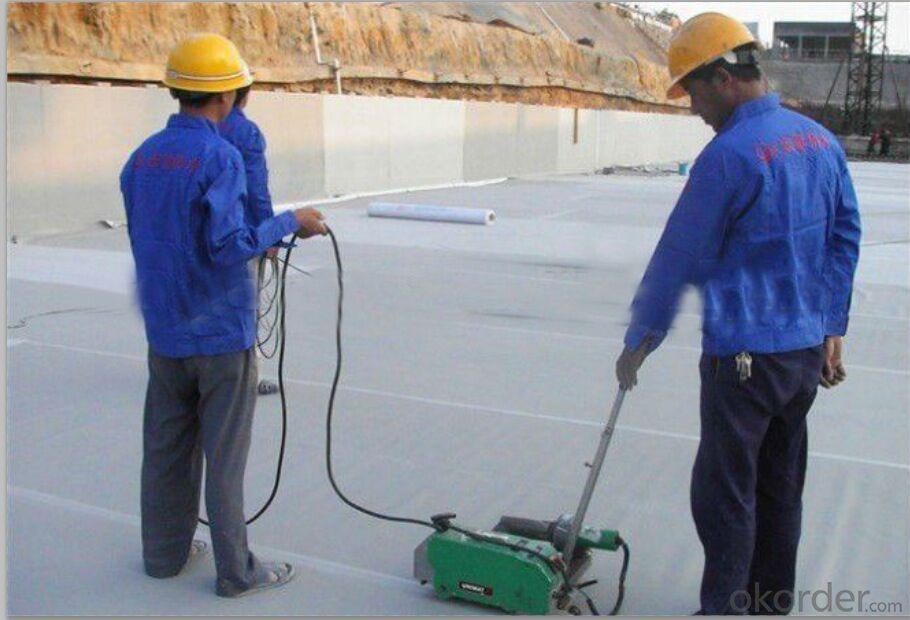
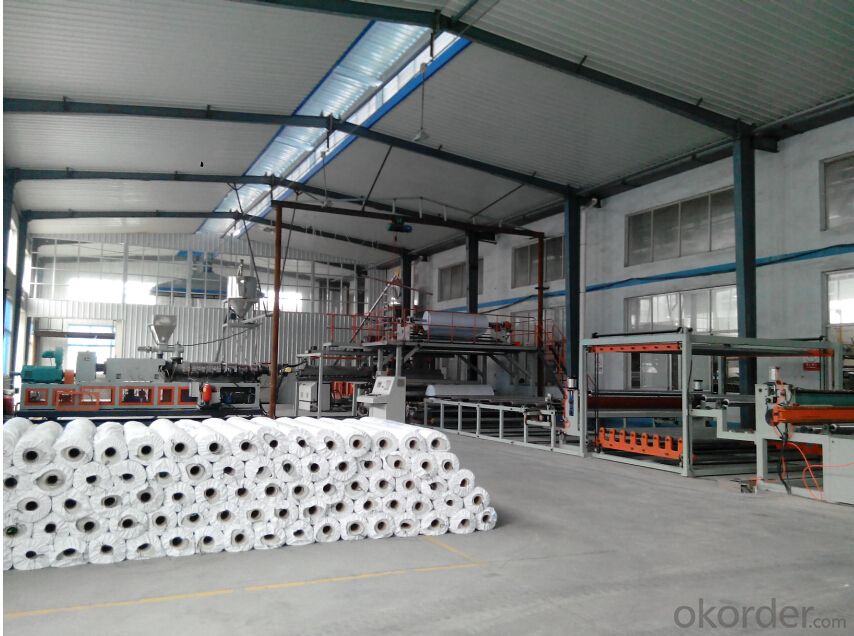
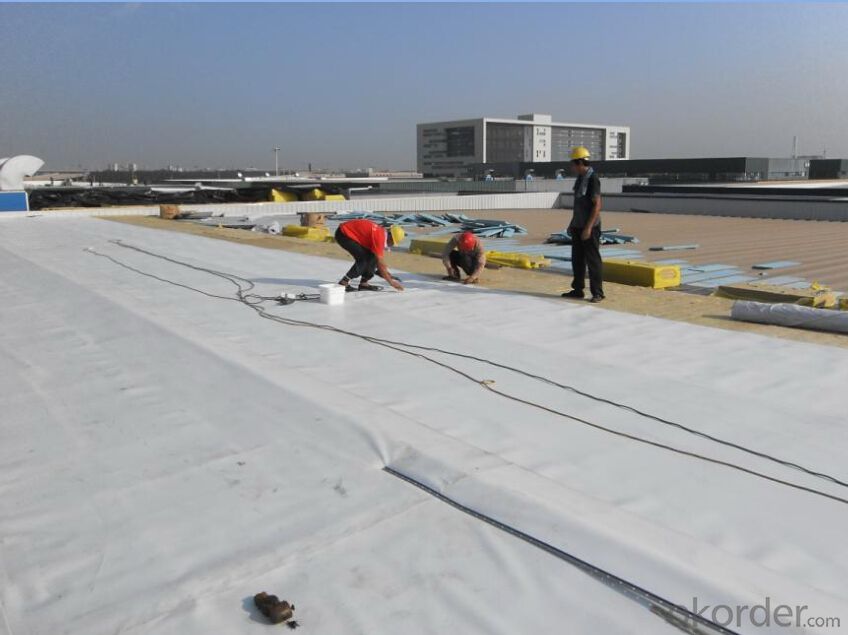
FAQ:
Can you produce 4m width?
Yes, no problem for us. We have four bases in China, largest one in this field.
How many quantity in one 20'' container for 1.2mm and 1.5mm?
480rolls, 11520m2 for 1.2mm and 400rolls, 9600m2 for 1.5mm
Can you provide free samples?
Yes, our samples are free, but express fees usually on buyer's account.
- Q:Can a waterproofing membrane be used on precast galvanized surfaces?
- Yes, a waterproofing membrane can be used on precast galvanized surfaces. The membrane will provide an additional layer of protection against water penetration and help to prevent corrosion on the galvanized surface.
- Q:Can a waterproofing membrane be used for elevator shafts?
- Yes, a waterproofing membrane can be used for elevator shafts. Elevator shafts can be susceptible to water infiltration, especially in locations with high water table or prone to flooding. A waterproofing membrane acts as a protective barrier against water penetration, helping to prevent damage to the elevator shaft and its components. It is an effective solution to ensure the longevity and proper functioning of elevator systems in such conditions.
- Q:Can a waterproofing membrane be used for both interior and exterior applications?
- Yes, a waterproofing membrane can be used for both interior and exterior applications. Waterproofing membranes are designed to prevent water penetration and provide protection against moisture damage. They are commonly used in basements, bathrooms, and other interior spaces to prevent water intrusion and dampness. Additionally, waterproofing membranes can also be applied to the exterior of buildings to protect against rain, snow, and other external elements. By using a waterproofing membrane for both interior and exterior applications, you can ensure comprehensive protection against water damage and maintain the structural integrity of your property.
- Q:Can a waterproofing membrane be used for planter boxes or green roofs?
- Yes, a waterproofing membrane can be used for planter boxes or green roofs. It helps to prevent water leakage and protect the underlying structure.
- Q:Can waterproofing membranes be used on terraces?
- Yes, waterproofing membranes can be used on terraces to prevent water penetration and protect the underlying structure from moisture damage.
- Q:Are waterproofing membranes suitable for high-traffic areas?
- Yes, waterproofing membranes are suitable for high-traffic areas. Waterproofing membranes are designed to provide a protective barrier against water infiltration, preventing water damage and maintaining the integrity of the structure. High-traffic areas, such as walkways, driveways, parking lots, and other heavily used spaces, are prone to constant exposure to water, which can lead to structural damage and deterioration over time. By applying a waterproofing membrane, these areas can be effectively protected from water intrusion, ensuring their durability and longevity. Additionally, waterproofing membranes are often designed to be slip-resistant, providing an added safety feature in high-traffic areas. Therefore, using waterproofing membranes in high-traffic areas is a wise choice to mitigate water-related issues and maintain the structural integrity of the space while ensuring the safety of occupants.
- Q:Can a waterproofing membrane be applied on curved surfaces?
- Yes, a waterproofing membrane can be applied on curved surfaces. In fact, waterproofing membranes are designed to be flexible and adaptable, making them suitable for application on various shapes and contours, including curved surfaces. These membranes are typically made from materials such as modified bitumen, polyurethane, or rubber, which have excellent elongation and flexibility properties. They can be easily molded and stretched to conform to curved surfaces without compromising their waterproofing capabilities. This allows for effective waterproofing of structures with curved components like roofs, balconies, tunnels, and tanks. Proper installation techniques and specialized tools may be required to ensure proper adherence and complete coverage on curved surfaces, but with the right expertise and materials, waterproofing membranes can be successfully applied on curved surfaces.
- Q:Can a waterproofing membrane be used for wastewater treatment plants?
- Indeed, wastewater treatment plants can make use of a waterproofing membrane. Waterproofing membranes are frequently employed in various construction undertakings, including wastewater treatment plants, to establish a barrier against the infiltration of water. These membranes are specifically designed to prevent water from permeating the structure, which is of utmost importance for wastewater treatment plants due to their handling of considerable water volumes. Wastewater treatment plants constantly face exposure to water and high levels of humidity, which may result in moisture-related harm and structural degradation. By incorporating a waterproofing membrane, the facility can effectively avert water penetration, thereby ensuring the soundness and longevity of the structure. Furthermore, wastewater treatment plants commonly contain diverse corrosive chemicals and substances that can cause damage to the structure over time. Waterproofing membranes can serve as a protective layer, effectively shielding the building materials against these chemicals and deterring structural problems. Various types of waterproofing membranes are available, such as sheet membranes, liquid membranes, and cementitious membranes. The selection of a suitable membrane depends on the specific requirements, financial considerations, and prevailing conditions at the wastewater treatment plant. It is imperative to choose a membrane that is compatible with the chemicals present in the wastewater and capable of withstanding the harsh conditions prevalent at the facility. In conclusion, a waterproofing membrane proves to be an appropriate solution for wastewater treatment plants as it effectively safeguards the structure against water infiltration and chemical harm. By implementing an appropriate waterproofing system, the facility can ensure the long-term durability and operational effectiveness of the plant.
- Q:Can a waterproofing membrane be used on masonry surfaces?
- Yes, a waterproofing membrane can be used on masonry surfaces. It is a common practice to apply waterproofing membranes on masonry surfaces to prevent water penetration and protect the structure from moisture damage.
- Q:Can a waterproofing membrane be used in conjunction with warranty or insurance policies?
- Typically, a waterproofing membrane can be used alongside warranty or insurance policies. Various waterproofing products and systems come with warranties that offer coverage for a specific duration, typically ranging from 5 to 20 years or even longer. These warranties often guarantee the effectiveness and durability of the waterproofing membrane, and may include provisions for repairs or replacements in the event of any failures or defects. Moreover, insurance policies may also provide coverage for damages caused by water leaks or flooding. By installing a waterproofing membrane, property owners can minimize the risk of water damage and potentially lower their insurance premiums. It is advisable to inquire with your insurance provider to determine if they offer any discounts or incentives for utilizing waterproofing systems. Nevertheless, it is crucial to note that the coverage provided by warranties and insurance policies may vary based on specific terms and conditions. It is recommended that you carefully review the details of the warranty or insurance policy and seek guidance from professionals to ensure that the waterproofing membrane aligns with the requirements and specifications outlined in these agreements.
1. Manufacturer Overview |
|
|---|---|
| Location | |
| Year Established | |
| Annual Output Value | |
| Main Markets | |
| Company Certifications | |
2. Manufacturer Certificates |
|
|---|---|
| a) Certification Name | |
| Range | |
| Reference | |
| Validity Period | |
3. Manufacturer Capability |
|
|---|---|
| a)Trade Capacity | |
| Nearest Port | |
| Export Percentage | |
| No.of Employees in Trade Department | |
| Language Spoken: | |
| b)Factory Information | |
| Factory Size: | |
| No. of Production Lines | |
| Contract Manufacturing | |
| Product Price Range | |
Send your message to us
PVC Roofing Waterproof Plastic Membrane Best Quality
- Loading Port:
- Qingdao
- Payment Terms:
- TT OR LC
- Min Order Qty:
- 3000 m²
- Supply Capability:
- 300000 m²/month
OKorder Service Pledge
OKorder Financial Service
Similar products
New products
Hot products
Related keywords
